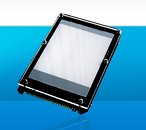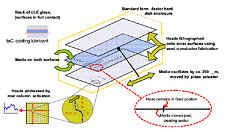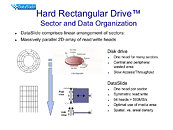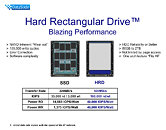Friday, June 26th 2009
Hard Rectangular Drive Could be the Hard Disk Answer to SSDs
A company called DataSlide has decided its not time for mechanical disk drives also known as hard disk drives (HDD) to roll over and die with SSDs beating them in just about every aspect other than price. The key aspect of the new technology is that it does not require the data platter to be spun like conventional hard disk drives do. For a start this provides savings in power consumption and due to the use of magnetic recording media as found in hard disk drives should allow the hard rectanguar drive (HRD) to be cheaper than an SSD or at least provide significantly more usable space for your money. A diagram explaining the technology and the manufacturers details and specifications follow.DataSlide's Hard Rectangular Drive (HRD) capitalizes on standard base process technologies to create a dramatically new way to store and retrieve data with magnetic media:
1. Leverage LCD process
2. Use standard HDD sputtering/plating MEMS process
3. Use HDD perpendicular media DSSC/Oerlikon-Balzers coatings
DataSlide applies technology in new, patented ways to achieve unprecedented high performance
160,000 IOPS & 500MB/sec and low power <4 Watts for a magnetic storage device:
1. A piezoelectric actuator keeps the rectangular media in precise motion
2. A diamond solid lubricant coating protects the surfaces for years of worry free service
3. A massively parallel 2D array of magnetic heads reads from or writes to up to 64 embedded heads at a time
Source:
DataSlide
1. Leverage LCD process
2. Use standard HDD sputtering/plating MEMS process
3. Use HDD perpendicular media DSSC/Oerlikon-Balzers coatings
DataSlide applies technology in new, patented ways to achieve unprecedented high performance
160,000 IOPS & 500MB/sec and low power <4 Watts for a magnetic storage device:
1. A piezoelectric actuator keeps the rectangular media in precise motion
2. A diamond solid lubricant coating protects the surfaces for years of worry free service
3. A massively parallel 2D array of magnetic heads reads from or writes to up to 64 embedded heads at a time




70 Comments on Hard Rectangular Drive Could be the Hard Disk Answer to SSDs
When does this come out. It sounds all great and stuff, but unless this is due to come out in the next year or so, SSD will be cheap enough (hopefully) by then to compete price wise.....which will create competition making everything cheaper and better.
This is getting good.
Technically if they added more heads to a standard HDD and slowed down the motor, that should have the same result - with less friction. All they really need is a way to replace the motor which is primarily what fails.
When the HDD is spinning the heads float on a airfoil surface that is near frictionless, it is the contaminants, bumps, drops, and the startup and shutdown that damages and wears out heads, and causes damage to the disk itself.
Are you an SSD/HDD/HRD engineer perhaps?
:)
Doesn't take much common sense to figure that one out.
Why cant there be some invention that can read magnetically recorded data faster than a chip?
Its good to keep your mind open :)
Oh and for the record electricity moves really slow take the following from wiki as an example:
If it ever gets to stores that is :)
who cares if they get overtaken - you wouldnt stop buying Nvidia just because AMD released ONE video card that was faster, once... you choose whats best AT THE TIME.
The capacity/$ will never be competitive for SSDs.
This is an industry consensus, and one that I agree upon (and I'm in charge of the SSD line at my company).
SSDs have their place in high performance systems, hard drives have their place in high capacity systems.
While this idea HRD is interesting, it will be a number of years before even a workable solution comes out.electric fields propogate at the speed of light.Careful now, the drift velocity of electrons is not equal to the "speed of electricity"...
Electric field propogates at the speed of light (through the wire almost instantaneously)
Without getting into the electron physics, just imagine the wire is a pipe filled with water..
The electric field corollary would be water pressure.
Turn on the light switch (open the water valve), and the electrons start flowing almost immediately through the entire pipe (the water pressure pushes the standing water out the end of the pipe pre-filled with water almost immediately).
So here's a thought question:
If the drift velocity of electrons is 1m/hour, why doesn't it take 4 hours to turn on the light bulb from your light switch?
Answer?
Because the wire isn't empty- the copper atoms are already "filled with electrons", just like a filled water pipe.
Regular hard drives are better atm because they offer much more space per dollar than SSDs. There is one 512GB SSD on newegg for $1575. Or, for $240, you could buy the 2TB Western Digital drive... or for $480 get two and use RAID 1 for data redundancy
Also you won't need to worry about the heads floating above the platter and damaging the data if they touch because the heads are always directly contacting the platter.
And you don't need to worry about that stupid torque on the left side of your laptop when your HDD is running.
I think that the trick here would be to get two oscillating platters in a disc. If they oscillate opposite each other, there's no net momentum. And if we can speed everything up to about 30khz, you won't hear a thing (unless you've got freakishly good hearing that is)